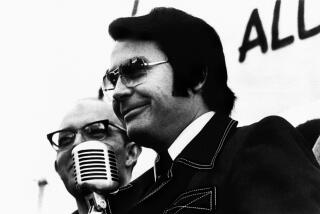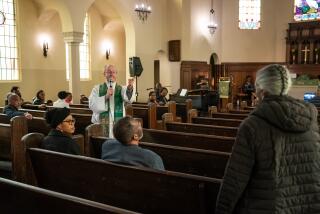Success; but What’s the Price? : Worship: Willow Creek’s congregants don’t worry about hell but a “Christless eternity.” But as such churches spread, some fear that religion is being sacrificed to marketing.
- Share via
SOUTH BARRINGTON, Ill. — One thing is clear: Willow Creek is no typical church.
Named after the former theater where church members first met, it resembles a vast movie house with windows overlooking a pond. There are no crosses and no stained-glass windows.
Don’t look for a hymnal--lyrics are flashed onto video screens. Preachers avoid the term reverend , and no one sits on pews, just comfortable theater-like seats. Worshipers are less likely to hear the word hell than a euphemism such as “a Christless eternity.”
The Protestant evangelical church and hundreds like it nationwide are attracting more people than most mainstream congregations ever dreamed possible.
Willow Creek, located in the heart of upper-middle-class suburbia, draws an average of 15,000 worshipers each weekend; 20,000 flocked to the church’s 20th anniversary celebration recently at Chicago’s United Center sports arena.
But with the success of these churches come questions. Are they diluting or distorting the biblical message? Or are they simply delivering it in more compelling fashion than more traditional congregations with empty pews on Sunday morning?
“Whenever the marketing begins to shape the content of the message--not the style but the content--then there is the potential that religion has turned to business,” said Quentin J. Schultze, author of “Televangelism and American Culture: The Business of Popular Religion.”
At Willow Creek Community Church’s three weekend services--one Saturday night and two Sunday--the dress is casual. And when the lights dim and the music blares, you can clap, sway, or tap your feet. There’s plenty of video and drama along with darts, basketball and coloring for the youngsters.
There’s also a food court fit for a shopping mall and a nursery in what the church calls “Promiseland,” complete with brightly colored playground equipment, where children learn about God.
But founding pastor Bill Hybels says those trappings are not central to the church’s mission.
“It’s not about marketing, and it’s not about the drama and music . . . so much as it is the historic Christian message being taught and believed by people who share it with their friends,” he said.
Hybels, the son of Dutch Christian Reform parents, founded Willow Creek with 125 members in 1975 after he and others went door to door to find out why people did not attend church.
Willow Creek appeals to an eclectic breed of believers and “seekers”--a name for “unchurched” people in search of spiritual answers. Many, like the 43-year-old Hybels, are baby boomers.
Some are disenchanted Catholics seeking relevance over ritual; some are Protestants who quit organized religion in their 20s and now want to return. Some are former atheists, like assistant pastor Lee Strobel, who became a Christian in 1981. Others are Jewish, like Ralph Miller, who once wanted to be a rabbi but found the requirements “too regimental.”
Here, when the collection plate is passed, an announcer tells seekers to relax; they are not required to contribute. There are no pledges--that’s “between them and God,” Strobel says. Still, Willow Creek boasts a $12.5 million annual budget.
Ministries range from budget counseling to outreach for prisoners’ families and ex-convicts re-entering society.
“A lot of time when I’d go to the Catholic church, I’d leave and not know what to do with the service,” said Gayle Schultz, 30, of Crystal Lake. “I would always say, ‘That was then; what about today?’ With these services, I can leave and carry out the service every day of my life.”
But what if the medium begins to obscure the message?
“At the end of the day, if you have a Gospel that is more shaped by the baby boomers than it is by the New Testament, you’ve surrendered the Gospel and sold it out,” said Os Guinness, a social scientist whose book “Dining With the Devil” addresses the mega-church movement.
“If you’re . . . always tailoring, accommodating, diluting, eventually you don’t have anything Christian left.”
Guinness had only praise for Hybels’ efforts at Willow Creek, but said, “The problem is with the clones of Willow Creek.”
But Christian scholars say there’s a place for a message tailored to the unchurched, as long as it’s a way to bring them closer to the full-fledged biblical message.
“Their purpose in this seeker service is not to try to teach biblical doctrine or to try to provide a full experience of a Christian faith; it is to try to introduce the idea of the church and the Christian faith to people who are currently outside of it,” said Michael Duduit, editor of the journal Preaching.
“It’s a starting place.”
More to Read
Sign up for Essential California
The most important California stories and recommendations in your inbox every morning.
You may occasionally receive promotional content from the Los Angeles Times.













